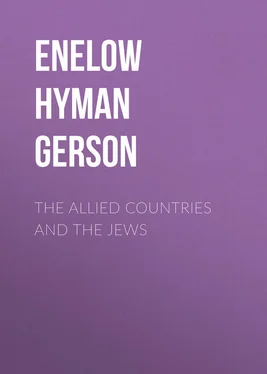Hyman Enelow - The Allied Countries and the Jews
Здесь есть возможность читать онлайн «Hyman Enelow - The Allied Countries and the Jews» — ознакомительный отрывок электронной книги совершенно бесплатно, а после прочтения отрывка купить полную версию. В некоторых случаях можно слушать аудио, скачать через торрент в формате fb2 и присутствует краткое содержание. Жанр: foreign_antique, foreign_prose, на английском языке. Описание произведения, (предисловие) а так же отзывы посетителей доступны на портале библиотеки ЛибКат.
- Название:The Allied Countries and the Jews
- Автор:
- Жанр:
- Год:неизвестен
- ISBN:нет данных
- Рейтинг книги:3 / 5. Голосов: 1
-
Избранное:Добавить в избранное
- Отзывы:
-
Ваша оценка:
- 60
- 1
- 2
- 3
- 4
- 5
The Allied Countries and the Jews: краткое содержание, описание и аннотация
Предлагаем к чтению аннотацию, описание, краткое содержание или предисловие (зависит от того, что написал сам автор книги «The Allied Countries and the Jews»). Если вы не нашли необходимую информацию о книге — напишите в комментариях, мы постараемся отыскать её.
The Allied Countries and the Jews — читать онлайн ознакомительный отрывок
Ниже представлен текст книги, разбитый по страницам. Система сохранения места последней прочитанной страницы, позволяет с удобством читать онлайн бесплатно книгу «The Allied Countries and the Jews», без необходимости каждый раз заново искать на чём Вы остановились. Поставьте закладку, и сможете в любой момент перейти на страницу, на которой закончили чтение.
Интервал:
Закладка:
Hyman Gerson Enelow
The Allied Countries and the Jews
"Remember the days of old, consider the years of many generations."
– Deuteronomy."The dense web of the fortunes of man is woven without a void."
– Lord Acton."They, hearing History speak, of what men were, And have become, are wise."
– George Meredith.PREFACE
The addresses collected in this little book were delivered at the Sabbath morning Services of Temple Emanu-El during the autumn and early winter of 1917-18. I tried to give a bird's eye view of the relation of the Jews to the several countries with which America is now associated in the War for the defense of democracy. Also, I tried to point out how intimately the advance of democracy has been connected with the improvement of the lot of the Jew. Forming part of Divine Services, the addresses had to be short, but I hope they contained enough to illumine the subject and to stimulate thought, if not further study, as well as patriotic action.
In the present form, the substance is offered of the spoken addresses. The address on Russia may seem more hopeful than the situation today would warrant. Right now, unfortunately, chaos reigns in Russia, and the Jews are said to suffer terribly. Though Trotzky is reported to have renounced all affiliation with the Jews, or any particular interest in them, his changes of fortune are likely to react upon the people from which he sprang. None the less, we must not despair. In the end, Democracy must win in Russia, and find a way of living together and working together for the numerous racial and religious groups which form her vast population.
I wish to express my thanks to the Board of Trustees of Temple Emanu-El for their kindness in publishing these addresses and for generously providing a special number of copies for distribution among Jewish men in our Army and Navy.
H.G.E.Washington's Birthday, 1918.
I
FRANCE AND THE JEWS
Every American is now more than ever interested in Europe, and especially in those countries with which we are associated in the War. France, in particular, claims our attention. It is for this reason that as Jews we cannot help being interested in the relation of France to the Jewish people. Many of our sons soon will find themselves on French soil to take part in the liberation of France, which now means part of the defense of our own Republic. Not a few of our women, also, will be there – are there already, engaged in work of relief and restoration. It is but proper that we should recall what connection has existed between the Jew and France.
France has played an important part in Jewish history. There have been Jews in France from earliest times, perhaps from the very beginning of the Christian era. About the middle of the fifth century we know definitely that there was a considerable number of Jews in France and that they lived on terms of friendship with the rest of the population. When Hilary, bishop of Arles, died in the year 449, Jews as well as Christians wept at his funeral, the Jews chanting Psalms in Hebrew. From that early age on, France has been a most important factor in Jewish history.
The conditions of life for the Jew have not been the same there always. There is the usual story of vacillation and misfortune. France also has had her periods of persecution and expulsion for the Jews – particularly when she consisted of small provinces and factions. There was the usual story of malign charges and disputations, and Hebrew books now and then were confiscated and burnt as containing attacks on Christianity. The public burning of the Talmud at Paris, in the year 1242, the several expulsions during the fourteenth century, culminating in the expulsion of 1394 – just about a century before the expulsion from Spain – are among the tragic incidents of medieval Jewish history. France did not escape the religious fanaticism which formed one of the dark features of the middle ages.
But all in all, the Jews have had a glorious history in France, crowned by the fact that she was the first country in Europe to give full civil and political rights to the Jews, as she did during the Revolution, on September 28th, 1791. France thus inaugurated a new era in Jewish history. Indeed, she thus brought about the modern rebirth of the Jew – the Jew's full entry into modern life. Therefore, when it is said that every man has two countries – his own and France, we may justly apply it in particular to the modern Jew.
Nor was the leadership of France in the modern emancipation of the Jew an accident. It was part of the liberal spirit which has found varied expression in France, and which could not ignore the Jew and the maltreatment that was meted out to him all over Europe.
When Montesquieu wrote his great work, The Spirit of the Laws , in the year 1748, he did not forget all the services that the Jews had rendered to civilization, nor did he fail to deplore the outrageous way the Jews were dealt with. The Christians, he affirmed, were treating their Jewish neighbors in a more inhuman way than the Japanese of those days treated the Christians. Readers of Montesquieu could not help remembering that remonstrance, and it is quite likely that Louis XVI was inspired by it to the abolition of the Jewish poll-tax, as well as to the appointment of a special commission, under the presidency of Malesherbes, for the study of Jewish conditions, with a view to their improvement.
But it is not commonly known that about forty years before Montesquieu issued his book, there appeared in France an epoch-making work, of which the leading Jewish historian, Graetz, has well said that it rendered an incalculable service to Judaism.
This work was the History of the Religion of the Jews , by Jacques Basnage de Beauval, a celebrated scholar and writer, published in the years 1707-11. It marked the first attempt to write a complete history of the Jews from the time of Christ to modern times, and was designed by the author as a continuation of the historical work of Josephus.
It was particularly noteworthy coming from a Christian theologian, seeing that the conventional Christian view was (and often still is) that the Jewish religion really ceased with the coming of Jesus. Christianity was supposed to have abolished and eliminated Judaism. Yet Basnage realized that the contrary was true. Judaism was not dead. The Jews were still alive.
For five years he gave himself to the task of collecting material, and he produced a work which, whatever its shortcomings, was remarkable as the first of its kind, aside from the enormous amount of scholarship that went into its composition. But there was more than scholarship in the work; behind it was a realization of the marvel of Jewish history and resentment of the brutality with which the Jew was treated. Let no one wonder, said the author, if we denounce certain charges made against the Jew. "In the course of the centuries people have developed a spirit of cruelty and barbarism toward the Jews. They have been accused of being the cause of all calamities and charged with all kinds of crimes which never entered their minds. Everywhere they have been mobbed and massacred. Nevertheless, by a miracle of Providence, they still exist today everywhere. The bush of Moses, encircled by flames, has always burnt without being consumed."
The liberal spirit of Montesquieu and Basnage found new expression, and, we may say its culmination, in the men of the Revolution. Mirabeau, who in Berlin came in contact with Mendelssohn and got to know Dohm's famous work on the Civil Improvement of the Jews, issued in 1781, wrote a warm plea for the emancipation of the Jews, under the title of Mendelssohn and the Political Improvement of the Jews . His plea was supported by Gregoire, a priest, and Duport, a Jacobin member of the National Assembly, and it finally resulted in the Assembly's abrogation of Jewish disabilities, and the invitation to the Jews to take the oath of citizenship.
Читать дальшеИнтервал:
Закладка:
Похожие книги на «The Allied Countries and the Jews»
Представляем Вашему вниманию похожие книги на «The Allied Countries and the Jews» списком для выбора. Мы отобрали схожую по названию и смыслу литературу в надежде предоставить читателям больше вариантов отыскать новые, интересные, ещё непрочитанные произведения.
Обсуждение, отзывы о книге «The Allied Countries and the Jews» и просто собственные мнения читателей. Оставьте ваши комментарии, напишите, что Вы думаете о произведении, его смысле или главных героях. Укажите что конкретно понравилось, а что нет, и почему Вы так считаете.












